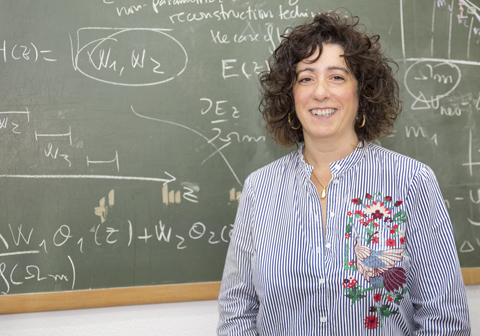Ruth Lazkoz, lecturer in the Gravitation and Cosmology Research Group of the UPV/EHU-University of the Basque Country, is the president of the CANTATA network (Cosmology and Astrophysics Network for Theoretical Advances and Training Actions). Funded by the European COST programme, this four-year research project is seeking to explore, in a coordinated and multidisciplinary way, the extension of Einstein's general relativity theory on scales on which it has yet to be properly confirmed.
The UPV/EHU is leading a piece of research involving 200 experts in astrophysics and cosmology from 25 countries
This European collaborative project is seeking to explain why the universe does not behave as expected according to Einstein's theory of gravity
First publication date: 30/06/2017

The universe is expanding faster and faster. But scientists have not managed to explain how and why this happens. Observations made over the last few years reveal that the universe does not behave as expected on the basis of Einstein's theory of gravity. "The gravity we know is attractive gravity; yet repulsive gravity is needed to accelerate the expansion of the universe. For example, within the framework of Einstein's Relativity, we are unable to fully understand that two planets could be repelling rather than attracting each other, because our intuition tells us that gravity must be attractive," explained Ruth Lazkoz, a holder of a PhD from the UPV/EHU. In this respect, the researcher in the UPV/EHU's Gravitation and Cosmology Research Group, says that "it is very important to explore new theories of gravity and their implications so that the observational data we have available can be correctly interpreted".
The CANTATA project, funded by the European COST research programme, and presided over by Ruth Lazkoz, includes complementary aspects of theoretical physics, cosmology and astrophysics. The four-year project coordinates the multidisciplinary work carried out by over 200 experts in gravitational physics and cosmology from 25 countries within a piece of research that is contemplating the possibility of going beyond general relativity on scales on which Einstein's theory fails. "The CANTATA project basically aims to study whether there is any way of ascertaining, using the astrophysical data we have available, whether we have to go beyond Einstein's theories to explain, for example, why the galaxies are moving away from each other in an accelerated way instead of slowing down, which is known as the accelerating expansion of the universe," explained Lazkoz.
Co-operation, mobility and values
One of the aims of the CANTATA project is to improve the existing collaboration between research groups from different countries and set up a stronger European Research Network in this field. The project aims to get all these multidisciplinary groups comprising the network to work in a single direction by exchanging ideas, and promotes mobility and stays in other countries. A year after it was set up, Lazkoz rates "the project in very positive terms as it has helped to showcase the work of many research groups which used to work in a very independent way. The project has provided all of us with an entity". But besides being an entity for collaborative research work and development of synergies among all the experts and across all competences, the project being funded by the European COST programme places great value on other, more social aspects in the world of research.
The project offers a whole host of opportunities to encourage, prepare and promote young researchers and make them more visible. It also channels interaction between senior researchers in the network and young researchers by means of seminars, meetings and workshops. It also devotes special attention to inclusiveness in the project in countries that have so far not had many repercussions in research matters. The project also encourages gender equality as it devotes much importance to the empowerment of women scientists.
Lazkoz concludes by saying that "we are seeking to better understand the universe throughout its history, from the Big Bang until the present day: the period of accelerated expansion that existed at the beginning, how the structure as we know it was formed, how it is expanding, etc. It is really difficult to be able to find a description of gravity as the problems that remain to be solved are increasingly difficult". The researcher says that they are keen for this project to sow the seeds of future collaboration.
Additional information
The president of the CANTATA project Ruth Lazkoz is a lecturer in the Gravitation and Cosmology Research Group in the UPV/EHU's Department of Theoretical Physics and the History of Science.

